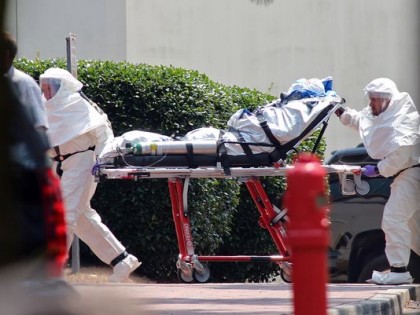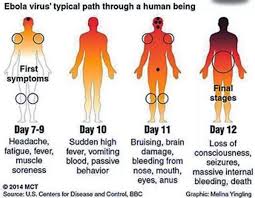By Dr Kemi Omololu-Olunloyo (Special to NTA)
Earlier this week, news came down that America has its first diagnosed human Ebola patient, a man named Thomas Eric Duncan who was admitted to Texas Presbyterian hospital in Dallas, Texas. Immediately we health care professionals watched how panic set in fast in that US state and across that country. It was another Liberian. After what happened here in Nigeria July 20th 2014 when another Liberian infected several Nigerians with 7 deaths, 19 diagnosed cases and 900 in quarantine and treated, setting our country of 177 million, Africa’s most populous into panic and fear. Patrick Sawyer was also a defiant patient who deliberately spread the disease ripping off his intravenous drips and urinating on doctors and nurses. He was simply lawless and disregarded human life!
We have become more cautious of who enters our borders. Liberians are complaining of being stigmatized by Nigerians. Two doctors Ameyo Adadevoh and Iyke Enemuo lost their lives along with nurses and other patients. One nurse Justina Elejonu was pregnant in the early stages and lost her baby after catching Ebola on the second day at her new job at First Consultants Hospitals in Lagos. I covered the facility extensively informing Nigerians of what to know instead of becoming paranoid. The Federal Ministry of Health headed by Minister Onyebuchi Chukwu and his Special Media and Communications man Dan Nwomeh went on social media alerts feeding Nigerians with tweet after tweets of details of how we can contain the epidemic. Who is infected, who is quarantined, who is discharged and who died.
I recorded several videos and newscasts including a leaflet printed by the Lady Pharmacists Association of Oyo state which was in English and Yoruba to educate people in this vast city of Ibadan. I went ahead and recorded it for them on Soundcloud.com/HNNAfrica so people could download it into their devices. I educated Okada operators at motor parks on safety carrying multiple passengers, educated people at suya spots and bush meat selling areas of markets as well as rallies with market women teaching them clean hygiene habits and refraining from stuffing cash in their bras which could be sweaty because Ebola could be transmitted in all body fluids. I even went to the prostitutes and gave them N2000 and a sex toy to get them completely offs the streets. That was hilarious and even worked. The streets were empty in front of the Ibadan clubs. Any health promo was crucial to preventing the spread in mine the largest city in West Africa.

Nigeria has never closed its borders to any countries despite the fact that Cameroon and others initially closed theirs to us, with South Africa even banning us from their country and others cancelling FIFA football events and more. We were stigmatized as a country! We managed to contain this outbreak that could have paralysed our beautiful country of 177 million. I for one living actively in Ibadan known as the largest city in West Africa was very vigilant educating people on the streets as I said earlier, something I do best as a community activist on other issues. It only takes one person to enter Ibadan to spread Ebola fast especially when Rivers state got the outbreak and many contacts of the late Dr Iyke Enemuo were missing and had to be traced. Contact tracing is very important in the Dallas area right now. America must utilize it ASAP. In a country of 300 million, an impending disaster must be stopped. Thomas Eric Duncan the Liberian man who only came to visit his son and the son’s mother also welcomed with a large barbecue party is now in critical condition that health officials have not been able to speak to him. He was apparently sent home initially after his first trip to the emergency room and that information was not communicated to health officials right away. Nigeria used the emergency operations centre to respond to the outbreak immediately as it was discovered which resulted in a rapid, effective co-ordinated response. 19 cases were diagnosed, 7 deaths and approximately 900 contacts were identified with the last two in their 21 day quarantine discharged October 2nd 2014.

The key is to speed up an emergency response. Nigeria’s Health Minister Prof Onyebuchi Chukwu never sat on his desk, he was on the move from state to state, launching quarantine centres, visiting staff and patients. All members of US health teams in hospitals should be vigilant, fast and communicate. Hospital Presidents should have meetings with all key staff to address the “what if it happens here factor.” I was a member of the Board Of Governors of Canada’s oldest public hospital, Kingston General hospital in Ontario in 2010. That hospital had meetings monthly on key issues regarding patient health and safety. If hospitals are going to adhere to HIPAA laws, (Health Information Portability and Privacy Act) a law governing privacy in the medical field in America, adhere to it without mentioning the patients name or detailed information per family request. I suggest hospitals use a lot of PR, hold regular press conferences like the Special Media Assistant to our health Minister Dan Nwomeh did here. Use Twitter and Facebook and any other social media heavily to educate the public. We made it! Though Dr Frieden the head of the Centre For Disease Control (CDC) commends our country, he also said we are not totally out of the woods yet.
The core part of it is also media. Health Journalism is considered the most boring to many reporters but as a Pharmacist that also studied Broadcast Journalism, I feel we are part of the first responders for information and education in this now global Ebola outbreak. Stay safe and healthy everyone! Watch my final report from Nigeria’s ground zero where Patrick Sawyer deliberately infected health workers. We lost a great doctor Dr Stella Ameyo Adadevoh a childhood family friend and two of her nurses

Nigeria has never closed its borders to any countries despite the fact that Cameroon and others initially closed theirs to us, with South Africa even banning us from their country and others cancelling FIFA football events and more. We were stigmatized as a country! We managed to contain this outbreak that could have paralysed our beautiful country of 177 million. I for one living actively in Ibadan known as the largest city in West Africa was very vigilant educating people on the streets as I said earlier, something I do best as a community activist on other issues. It only takes one person to enter Ibadan to spread Ebola fast especially when Rivers state got the outbreak and many contacts of the late Dr Iyke Enemuo were missing and had to be traced. Contact tracing is very important in the Dallas area right now. America must utilize it ASAP. In a country of 300 million, an impending disaster must be stopped. Thomas Eric Duncan the Liberian man who only came to visit his son and the son’s mother also welcomed with a large barbecue party is now in critical condition that health officials have not been able to speak to him. He was apparently sent home initially after his first trip to the emergency room and that information was not communicated to health officials right away. Nigeria used the emergency operations centre to respond to the outbreak immediately as it was discovered which resulted in a rapid, effective co-ordinated response. 19 cases were diagnosed, 7 deaths and approximately 900 contacts were identified with the last two in their 21 day quarantine discharged October 2nd 2014.

The key is to speed up an emergency response. Nigeria’s Health Minister Prof Onyebuchi Chukwu never sat on his desk, he was on the move from state to state, launching quarantine centres, visiting staff and patients. All members of US health teams in hospitals should be vigilant, fast and communicate. Hospital Presidents should have meetings with all key staff to address the “what if it happens here factor.” I was a member of the Board Of Governors of Canada’s oldest public hospital, Kingston General hospital in Ontario in 2010. That hospital had meetings monthly on key issues regarding patient health and safety. If hospitals are going to adhere to HIPAA laws, (Health Information Portability and Privacy Act) a law governing privacy in the medical field in America, adhere to it without mentioning the patients name or detailed information per family request. I suggest hospitals use a lot of PR, hold regular press conferences like the Special Media Assistant to our health Minister Dan Nwomeh did here. Use Twitter and Facebook and any other social media heavily to educate the public. We made it! Though Dr Frieden the head of the Centre For Disease Control (CDC) commends our country, he also said we are not totally out of the woods yet.





